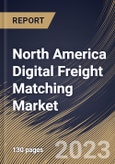Automation features such as automatic load booking, invoicing, and payments streamline the logistics process, reducing manual work for all parties involved. Various companies and startups operate DFM marketplaces and platforms, each with unique features and capabilities. Examples include Uber Freight, Convoy, and Loadsmart. DFM allows shippers to access capacity on-demand, adjusting their transportation needs as they fluctuate, which is especially beneficial for companies with variable shipping volumes.
DFM can contribute to sustainability efforts by reducing empty miles and optimizing routes, which, in turn, helps decrease greenhouse gas emissions. The market is competitive, with established logistics companies and startups vying for market share. Competition often leads to innovation and improvements in services. The market faces regulatory challenges, such as compliance with hours-of-service regulations and carrier insurance requirements. DFM solutions are expanding, addressing transportation and logistics needs in various regions. Shippers and carriers increasingly expect transparency, reliability, and ease of use from DFM platforms, driving ongoing development and enhancements in the market. The market has the potential to revolutionize the transportation of products, making the process easier, cost-effective, and environmentally friendly. As companies aim to optimize their supply chains and technology advances, they will likely continue to expand and develop.
North America, particularly the United States, is home to a robust e-commerce industry. The exponential growth of online shopping has increased the demand for efficient and flexible freight transportation, making DFM platforms attractive to shippers and carriers. DFM platforms offer significant efficiency gains in matching available loads with carriers, optimizing routes, and reducing empty miles. DFM helps shippers and carriers minimize transportation costs by eliminating intermediaries, improving route planning, and reducing administrative overhead associated with traditional freight booking. This presents significant growth opportunities for DFM providers that can satisfy the unique demands of the Canadian e-commerce sector. These factors expand the market growth in this region.
The US market dominated the North America Digital Freight Matching Market, By Country in 2022, and would continue to be a dominant market till 2029; thereby, achieving a market value of $52,579 million by 2030. The Canada market is experiencing a CAGR of 32.9% during (2023 - 2030). Additionally, The Mexico market would exhibit a CAGR of 31.7% during (2023 - 2030).
Based on Service, the market is segmented into Freight Matching Services, & Value-Added Services. Based on Transportation Mode, the market is segmented into Full Truckload (FTL), Less-than-truckload (LTL), Intermodal, and Others. Based on Platform, the market is segmented into Mobile-based (Android and iOS), & Web-based. Based on Industry, the market is segmented into Food & Beverages, Retail & E-Commerce, Automotive, Healthcare & Lifesciences, Oil & Gas, Manufacturing, and Others. Based on countries, the market is segmented into U.S., Mexico, Canada, and Rest of North America.
The market research report covers the analysis of key stakeholders of the market. Key companies profiled in the report include Uber Freight Holding Corporation (Uber Technologies, Inc.), Redwood Logistics (AEA Investors LP), C.H. Robinson Worldwide, Inc., XPO, Inc., Convoy, Inc., Full Truck Alliance Co. Ltd. (JiangSu ManYun Software Technology Co., Ltd.), Freight Technologies, Inc., Freight Commerce Solutions Private Limited, Cargomatic, Inc., Roper Technologies, Inc.
Scope of the Study
Market Segments Covered in the Report:
By Service- Freight Matching Services
- Value Added Services
- Full Truckload (FTL)
- Less-than-truckload (LTL)
- Intermodal
- Others
- Mobile-based
- Android
- iOS
- Web-based
- Food & Beverages
- Retail & E-Commerce
- Automotive
- Healthcare & Lifesciences
- Oil & Gas
- Manufacturing
- Others
- US
- Canada
- Mexico
- Rest of North America
Key Market Players
List of Companies Profiled in the Report:
- Uber Freight Holding Corporation (Uber Technologies, Inc.)
- Redwood Logistics (AEA Investors LP)
- C.H. Robinson Worldwide, Inc.
- XPO, Inc.
- Convoy, Inc.
- Full Truck Alliance Co. Ltd. (JiangSu ManYun Software Technology Co., Ltd.)
- Freight Technologies, Inc.
- Freight Commerce Solutions Private Limited
- Cargomatic, Inc.
- Roper Technologies, Inc.
Unique Offerings
- Exhaustive coverage
- The highest number of Market tables and figures
- Subscription-based model available
- Guaranteed best price
- Assured post sales research support with 10% customization free
Table of Contents
Companies Mentioned
- Uber Freight Holding Corporation (Uber Technologies, Inc.)
- Redwood Logistics (AEA Investors LP)
- C.H. Robinson Worldwide, Inc.
- XPO, Inc.
- Convoy, Inc.
- Full Truck Alliance Co. Ltd. (JiangSu ManYun Software Technology Co., Ltd.)
- Freight Technologies, Inc.
- Freight Commerce Solutions Private Limited
- Cargomatic, Inc.
- Roper Technologies, Inc.








